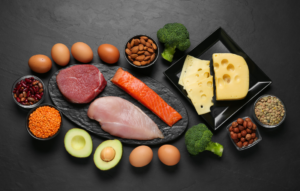When it comes to building muscle, recovering from workouts, or just maintaining better health in general, protein is essential. But did you know that not all proteins are created equal? Depending on their digestion speed, the protein you choose can make a big difference in your performance, muscle growth, and overall well-being. For the guys who are serious about their health and fitness, understanding the difference between fast and slow-digesting proteins is a key part of maximizing results.
In this blog, we’ll look into the basics of how protein works in the body, the differences between fast and slow-digesting proteins, and how each type can help you reach your goals. By knowing when and how to use these proteins strategically, you can improve your muscle growth, speed up your recovery, and better support your health. Let’s break down what makes these proteins different and how you can use them to your advantage.
Why Digestion Speed Matters
Protein plays a fundamental role in repairing and building muscle, supporting your immune system, and providing the building blocks for nearly every structure and function in your body. However, the speed at which protein is digested and absorbed can greatly impact these benefits. Fast-digesting proteins quickly flood your muscles with amino acids, providing rapid support when your body needs it most – like after a tough workout. On the other hand, slow-digesting proteins offer a sustained release of amino acids, making them ideal for periods when you won’t be eating for a while, such as overnight or between meals.
Key Factors Affecting Digestion Rate
The rate at which protein digests depends on a few key factors:
- Protein Type: Whey protein and egg whites are known to digest the quickest, while casein and beef protein digest more slowly.
- Fat and Fiber Content: Protein sources with higher fat or fiber content will naturally take longer to digest and absorb, which slows down the release of amino acids into your bloodstream.
- Amino Acid Profile: Proteins rich in branched-chain amino acids (BCAAs), like leucine, tend to digest more quickly and have a greater impact on muscle protein synthesis.
- Food Combinations: Consuming protein with other macronutrients (carbs and fats) can slow down the digestion process, which is why whole food meals digest more slowly than isolated protein sources like shakes.
The Science of Fast Digesting Proteins
Fast-digesting proteins, as the name suggests, break down quickly in the digestive system. They’re rapidly absorbed into your bloodstream, spiking amino acid levels to support muscle protein synthesis. This rapid absorption makes them particularly effective for times when your muscles are “hungry” for nutrients, like right after an intense workout. These proteins are also low in fat and fiber, which allows them to pass through your digestive system quickly and efficiently.
The Benefits
For men focused on building muscle and improving recovery, fast-digesting proteins offer unique benefits:
- Muscle Recovery and Growth: Fast proteins like whey are ideal for quickly delivering amino acids to muscles, helping repair and grow muscle fibers much more quickly after training.
- Prevention of Muscle Breakdown: After intense exercise, your body may start breaking down muscle for energy if it doesn’t receive adequate nutrition. Fast-digesting proteins can stop this catabolic process and jumpstart the anabolic (muscle-building) process.
- Convenient Source of Quick Energy: A fast-digesting protein snack or shake before a workout can provide a quick energy boost without the heaviness of whole-food meals, making it perfect for pre-workout fueling.
Best Sources and Usage
If you’re looking to incorporate fast-digesting proteins into your diet, here are some of the best options:
- Whey Protein Isolate & Hydrolyzed Whey: Whey is known as one of the fastest digesting proteins, ideal for post-workout recovery. Hydrolyzed whey is broken down even further to ensure the most rapid absorption, although whey isolate is digested almost just as fast, tends to taste better, and is often a bit cheaper.
- Egg Whites: A lean source of protein that is low in fat, making it a great option for those looking for a whole food source that digests quickly.
- Lean Fish and Poultry: Skinless chicken breast, turkey, and white fish like tilapia or cod are low in fat and fiber, providing a faster protein source than fattier cuts of meat.
- Greek Yogurt (Non-Fat): A versatile and fast-absorbing protein option that’s rich in BCAAs and perfect for a quick post-workout snack.
When to Use Fast Digesting Proteins
- Post-Workout: Within 30 minutes to an hour after your training session, consuming a fast-digesting protein like whey helps maximize muscle protein synthesis and kickstart recovery.
- Pre-Workout Snack: If you need a light protein boost before hitting the gym, a fast-digesting protein shake or egg whites can provide energy without weighing you down.
- First Thing in the Morning: After a long night’s fast, your body may benefit from a quick hit of protein to stop muscle breakdown and jumpstart your metabolism.

By using fast-digesting proteins strategically around workouts and periods of intense activity, you can ensure your muscles receive the nutrients they need to grow, recover, and stay strong.
How Slow Digesting Proteins Work and Their Benefits
Unlike their fast-digesting counterparts, slow-digesting proteins are broken down more gradually by your body. This means that they provide a steady stream of amino acids over a longer period, making them perfect for sustained muscle recovery and satiety. Slow proteins are often higher in casein, fat, or fiber, all of which slow down the digestive process and keep you feeling full longer.
Benefits for Men
Slow-digesting proteins have unique advantages, particularly for men who want to maintain muscle, keep hunger at bay, and ensure sustained recovery:
- Steady Amino Acid Supply for Muscle Recovery: Instead of providing a quick surge of protein, slow-digesting proteins release amino acids gradually over several hours. This extended delivery is ideal for preventing muscle breakdown during long periods without food (like overnight or between meals).
- Satiety and Weight Management: Since slow proteins take longer to digest, they help you stay fuller for longer, which can be a powerful tool for managing hunger and reducing cravings, particularly for men aiming to lose weight or maintain a lean physique.

- Better Overnight Recovery: Slow proteins are particularly beneficial before bed, as they provide muscles with a consistent supply of amino acids throughout the night, aiding in muscle repair and growth while you sleep.
Top Sources and When to Use Them
For those looking to add more slow-digesting proteins to their diet, here are some of the best sources:
- Casein Protein Powder: Unlike whey, casein digests slowly and provides a longer-lasting protein supply. A casein shake is great before bed or as a meal replacement.
- Cottage Cheese: High in casein, cottage cheese is a great slow-digesting protein that’s also packed with calcium. It’s perfect as a bedtime snack or when you need a light, yet filling meal.
- Whole Eggs: The fat content in whole eggs slows down digestion, offering a slower release of protein compared to egg whites alone. They’re versatile and work well in meals where longer satiety is needed.
- Beef & Other Red Meats: Even when lean, red meats tend to digest slower than poultry or fish, offering a sustained release of amino acids. These also tend to be particularly rich in micronutrients like iron and B vitamins.
- Nuts, Seeds, and Legumes: Plant-based sources like almonds, chia seeds, lentils, and beans will come with both protein and fiber, creating a slower digestion process that keeps you feeling full for a while.
When to Use Slow Digesting Proteins
- Before Bed: To support overnight muscle recovery, having a slow-digesting protein like casein or cottage cheese before bed ensures your muscles are being fueled while you sleep.
- Between Meals: Slow proteins are perfect when you know you’ll have an extended period without eating (e.g., during a busy workday), as they provide sustained energy and help keep hunger under control.
- Weight Loss and Appetite Control: If your goal is to manage your weight or reduce body fat by running a caloric deficit, incorporating slow-digesting proteins can help prevent overeating by keeping you feeling fuller for longer periods.
Using slow-digesting proteins at key times during the day not only optimizes your muscle recovery but also helps maintain steady energy levels and control hunger, making them an essential part of any nutrition strategy.
Practical Tips for Men
Incorporating both fast and slow-digesting proteins strategically into your diet is a game-changer for muscle growth, recovery, and better overall health. Here’s how you can make the most of each type:
- Use Fast-Digesting Proteins Post-Workout: After intense physical activity, a quick hit of fast-digesting protein like whey can maximize muscle protein synthesis and promote rapid recovery. Aim to consume 20-30g within 30 minutes to an hour after exercise.
- Choose Slow Digesting Proteins for Longer Satiety and Recovery: Slow proteins are your go-to for extended periods without food, overnight recovery, or when trying to manage your appetite. A serving of casein before bed or a meal with lean beef or legumes will provide a sustained release of amino acids.
- Plan Your Day Around Your Protein Needs: Your protein intake should align with your goals and lifestyle. For example, if you’re training in the morning, a fast protein source like a shake can jumpstart recovery. If you’re planning on a long day of meetings, a slow-digesting protein like cottage cheese or nuts will keep you full and energized.
- Mix and Match: There’s no rule saying you have to stick to one type of protein per meal. Combining fast and slow proteins, like having whole eggs with a side of yogurt, gives you a blend of rapid and sustained amino acid release.

A Sample Daily Plan
- Morning (Pre-Workout): A whey protein shake for quick energy and easy digestion.
- Post-Workout: Another whey protein shake or lean protein source like egg whites for rapid recovery.
- Midday Meal: A balanced meal with a moderate-digesting protein like lean chicken, paired with fiber and fats for sustained energy.
- Evening Meal: Slow-digesting options like beef or legumes provide steady protein release for the rest of the day.
- Before Bed: Cottage cheese or casein protein powder to support overnight muscle repair.
By balancing your fast and slow proteins, you’re able to optimize your muscle growth, recovery, and overall health throughout the day.
Conclusion
Protein plays a pivotal role in achieving peak health, muscle growth, and optimal recovery. By understanding the differences between fast and slow digesting proteins and when to use them, you can better fuel your body for success. Fast proteins like whey are ideal for post-workout recovery, quickly delivering amino acids to your muscles, while slow proteins like casein provide a steady supply over time, perfect for satiety and nighttime recovery.
So, summing it up: a balanced approach to protein timing and source selection is essential. Whether your goal is to build muscle, lose weight, or improve overall health, knowing when to use fast and slow proteins gives you the edge to stay strong and perform at your best.
Start experimenting with your protein strategy today, and notice how this small shift can lead to significant improvements in your body, health, and fitness.









